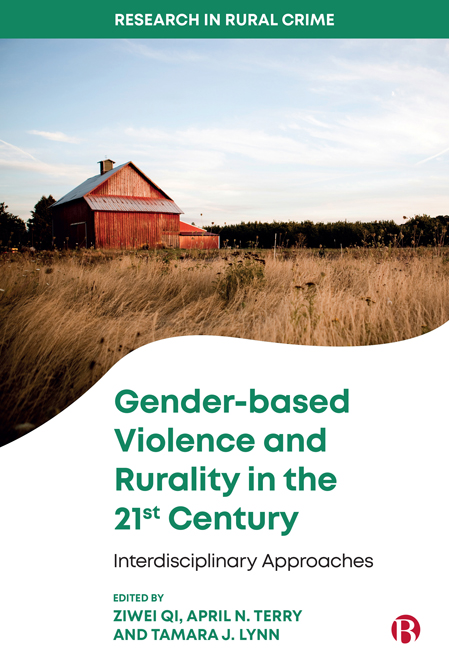Book contents
- Frontmatter
- Contents
- Series Preface
- List of Figures and Table
- List of Abbreviations
- Glossary
- Notes on Contributors
- Foreword
- 1 Understanding Rurality and Gender-based Violence
- PART I Rurality and Gender-based Violence
- PART II Beyond the Rural/Urban Divide: Critical Issues in Gender-based Violence
- PART III Access to Rural Justice: Economic Consequences and Policy Implications
- Index
9 - Religious Responses for Rural Sexual Assault Survivors
Published online by Cambridge University Press: 20 January 2024
- Frontmatter
- Contents
- Series Preface
- List of Figures and Table
- List of Abbreviations
- Glossary
- Notes on Contributors
- Foreword
- 1 Understanding Rurality and Gender-based Violence
- PART I Rurality and Gender-based Violence
- PART II Beyond the Rural/Urban Divide: Critical Issues in Gender-based Violence
- PART III Access to Rural Justice: Economic Consequences and Policy Implications
- Index
Summary
Introduction
Research documents positive aspects of rural living, including honesty, individualism and a high premium on religiosity (Willits et al, 1990). While these characteristics may be appealing, rural culture is romanticised (Tickamyer and Duncan, 1990) as some ignore the greater rates of poverty (Anderson Moore, 2006), similar rates of violence (Breiding et al, 2015), concerns about confidentiality and professionalism (Donnermeyer and DeKeseredy, 2014; Terry, 2018), and lack of accessible and quality resources (Peek-Asa et al, 2011). Gender-based violence (GBV) in rural places may be normalised due to patriarchal forces ascribing to hypermasculinity, sexism and traditional gendered stereotypes (Carrington and Death, 2014). In ‘close-knit’ communities, even where services are available, citizens tend to ‘work out interpersonal agreements’ (Freudenburg, 1986: 31) on their own as reputations are at stake. Many times, for girls and their families lacking a strong family name, their needs are ignored, and they are further pushed to the margins (Terry and Williams, 2019; Terry, 2020). This rural culture, coupled with fewer services, greater travel times and an inclusive ‘in-group’ environment, prevent professional treatment from being secured (Terry and Williams, 2019). Instead, individuals in need of services in rural places may turn to their religious institutions or receive no help at all.
Background
Girls and women in rural areas are held to rigid gender norms according to appropriate feminine behaviour (Terry and Williams, 2019) and as prescribed by patriarchal standards. When girls deviate from this script, the patriarchal system seeks to ‘correct’ or ‘protect’ them (Sherman and Balck, 2015). According to Williams and Craig-Moreland (2005), gender norms in rural communities may be more traditional than in urban areas, but also more mixed. For example, girls may be able to participate in traditional ‘male’ activities (such as driving a tractor) but they also remain in a culture that is bound by the ‘heavy hand of patriarchy’ (Williams and Craig-Moreland, 2005: 2). When referring to delinquent behaviours, the justice system tends to view the behaviour of girls and young women differently when compared to boys and men. Masculinity studies allow for the mentality of ‘boys will be boys’ while these same behaviours are penalised when observed in girls.
- Type
- Chapter
- Information
- Gender-based Violence and Rurality in the Twenty-first CenturyInterdisciplinary Approaches, pp. 124 - 142Publisher: Bristol University PressPrint publication year: 2023

